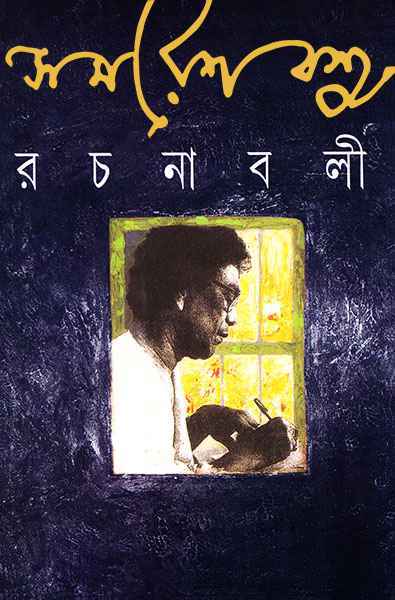Samaresh Basu Rachanabali 11
Samaresh Basu Rachanabali 11 is backordered and will ship as soon as it is back in stock.
Couldn't load pickup availability
Genuine Products Guarantee
Genuine Products Guarantee
We guarantee 100% genuine products, and if proven otherwise, we will compensate you with 10 times the product's cost.
Delivery and Shipping
Delivery and Shipping
Products are generally ready for dispatch within 1 day and typically reach you in 3 to 5 days.
🔹 Author: Samaresh Basu
🔹 ISBN: 9788177566307
🔹 Cover: Hardcover
🔹 Pages: 872
🔹 Weight: 1147 grams
About Samaresh Basu
Samaresh Basu, often referred to as the "Prince of Bengali literature", was a writer whose immense talent and literary contribution set him apart in the world of Bengali letters. His literary journey saw him rise from humble beginnings, against all odds, to become one of the most revered authors of his time. His works reflected a profound exploration of human nature, complex relationships, and the struggles of life.
Basu’s ability to transform adversity into creativity and success was extraordinary. His writing style was not confined to rigid frameworks; it evolved constantly, adapting to the changing nature of life itself. While his works were rooted in the realities of human existence, they were also deeply philosophical, touching on questions about life, death, morality, and the mysteries of existence.
What set him apart was his refusal to adhere to any rigid ideology or moral system. He wrote not just to entertain but to explore the depths of human experience, to uncover truths about identity, desire, and the struggle for meaning in a chaotic world. For Samaresh Basu, life was a dynamic process, and his literature followed this flow — never static, always evolving.
His work often examined the lives of ordinary men and women, delving into the emotional and social challenges they faced in their everyday lives. As he wrote:
“Sahityer ja kichu daay, se to jibaner’i kachhe. Sahityer theke jiban boro, e sathyer jonno sahityik ke ghorer anushilan korte hoy na, ta sathe sathe ati jibonto.”
Translation:
"Whatever responsibility literature carries, it lies with life itself. Life is greater than literature, and for this truth, the writer doesn’t need to practice deep meditation, it is always alive."
Contents of Volume 11
In this eleventh volume of Samaresh Basu’s Rachanabali, readers are presented with a rich compilation of his most influential novels and short stories. This volume includes eleven novels and six short story collections, further showcasing the author’s diverse range and deep understanding of the human psyche.
Novels:
- Yauvan
- Asongsho
- Bisher Swad
- Bikale Bhorer Phool
- Andhakarer Gaan
- Oder Bolte Dao
- Ramnam Kebolom
- Pathik
- Hridayer Mukh
- Nater Guru
- Bijorito
Short Story Collections:
- Panchabohni
- Ajana
- Hreshadhwani
- Bidyullota
- Biporit Rongo
- Bibaromukto - with the story Pahari Dhol
Each work in this volume offers a unique reflection of human life. The novels span a variety of themes, from the passages of youth and philosophical musings to moral dilemmas and political commentary. Samaresh’s exploration of these themes never shies away from difficult questions and unsettling truths about the human condition.
Themes and Analysis
In this collection, Samaresh Basu continues to showcase the complexity of human relationships, the conflict between individual desires and societal expectations, and the ever-changing nature of identity. His works from this period are particularly introspective, focusing on psychological and philosophical inquiries into life’s transience, the pursuit of meaning, and the experience of love and loss.
Samaresh Basu’s Style and Literary Legacy
Basu’s writing often involved a mix of realism, psychological insight, and social commentary, combining these elements to provide an almost cinematic portrayal of life. His characters are multidimensional, full of contradictions, grappling with their inner conflicts. While his novels address large philosophical and societal issues, his short stories often focus on the details of everyday life, capturing the beauty and sadness of human existence in small, intimate moments.
Throughout his life, Samaresh Basu never limited himself to a single genre or thematic concern. He was both a life artist and a life hunter, exploring the spectrum of human emotions — from love and desire to guilt and alienation. His works embody personal freedom, questioning societal norms, and often pushing boundaries.
A significant part of Basu's literary identity was the pen name "Kalakut", which marked the beginning of a distinctive period in his literary journey. Kalakut became an iconic figure in Bengali literature with the publication of his work "Amritakumbher Sandhane" (In Search of the Nectar of Immortality). The essence of Kalakut’s work lies in the idea of timelessness, as he said:
“Purana ar itihasher smriti, aar sara Bharater manush, tader bhasha, poshak, khadya aar nanna dharmik aachoron. Mone hoy ami yug theke yugantor ek lilaakshetre dariye achhi. Ei rooper modhye amar chokhe uthe ashe hazar hazar bochor aage er kono ghatna. Jeno ek abshaya ami sobay ke dekhte pachi.”
Translation:
"The memories of myth and history, the people of India, their language, clothing, food, and various religious practices — I feel as if I stand in a timeless field. In this form, I see events from thousands of years ago as if they are unfolding before my eyes."
This deep, philosophical perspective is reflected throughout his writing, with a broader vision of history and cultural continuity.
Conclusion
Samaresh Basu Rachanabali 11 continues to capture the essence of the human condition, exploring life’s complexities and society’s moral contradictions. His works span generations and remain relevant even today, offering a window into human nature that resonates deeply with readers. This volume, which includes both novels and short stories, showcases Samaresh Basu’s unmatched literary brilliance and philosophical depth.
For readers interested in diving deeper into the world of Samaresh Basu, this collection provides a rich tapestry of narrative styles and explorations into the psychology of the self, the truths of life, and the difficult choices we all face.





